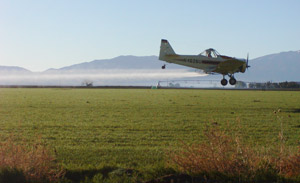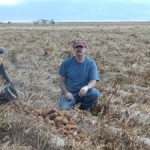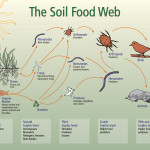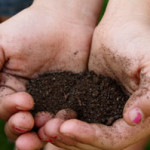Compost Tea Time on the Farm
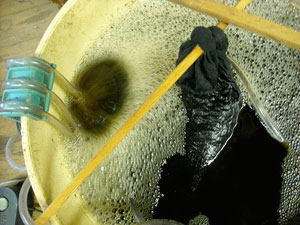 Compost Tea? No you don’t drink it but you could! It is a drink for your plants and soil instead.
Compost Tea? No you don’t drink it but you could! It is a drink for your plants and soil instead.
Prior to diving into the compost business we began making compost tea for our 180 acres of potatoes. This was in 2002 and compost tea was just gaining some popularity in our area but it has been around for ages, and like most other things has evolved.
Many people started making “tea” by soaking manure in water and then applying
that liquid to their plants. Any of you who have been around a ranch know what I’m
talking about. Think about the corrals after a good rain! This is not the compost tea
we were making and using. We were brewing aerobic compost tea, making sure our
tea was continually oxygenated during the brewing cycle, striving for a high oxygen level.
Keeping the oxygen level was a challenge because if you add to much food to the tea, the microbiology reproduces so quickly, that the oxygen is depleted turning the tea anaerobic.
While the terms aerobic and anaerobic sound similar it is an important distinction, especially in the compost world. In making our compost tea we needed to avoid anaerobic bugs because they are not safe to handle and not good to put on your crops, I am talking about salmonella, e coli, the bugs that make us sick.
From 5 Gallon Buckets to 500 Gallon Tanks
Many brewers get started making compost tea for their gardens in 5 gallon buckets. That would not work for us, our potato field is quite a bit larger than the average garden. So we began our brewing experiments in 500 gallon tanks. Developing a good recipe that provided consistent results was tricky and took time. I kept meticulous notes, regarding brew times, water temperatures, ingredients and oxygen levels. We also invested in good equipment to monitor the oxygen in the brewer to keep us on the right track.
the neighboring farmers started asking what we were doing to keep our potatoes looking nice and healthy unlike theirs that were growing on the other side of the fence.
Reducing Our Dependency On Chemicals
One of the driving factors in learning how to make compost tea was reducing our dependency on chemicals that we had been using on our potatoes. Once we started the tea we cut one of our treatments from 5 times down to one. We felt that the compost tea was making a positive impact on our plants, but the real affirmation came when the neighboring farmers started asking what we were doing to keep our potatoes looking nice and healthy unlike theirs that were growing on the other side of the fence. Our field was a vibrant green and the plants looked healthy and hearty while theirs were lackluster and dull green.
We told them that we were using compost tea not using as many chemicals. That was the only difference. Even after witnessing the visual differences between a tea field and a non-tea field, the popular stance was that using compost tea was akin to using snake oil to cure your cold. Traditional farmers just couldn’t wrap their head around spraying compost tea to make your plants healthy.
Firing Up the Crop Duster
One summer we sold our compost tea to an organic farmer to put on his potatoes for early blight. His only concern was getting it applied quickly and uniformly. That is where it comes in handy to live and work in a tight knit community. Rather than applying the tea throughout the center pivot sprinkler, we were able to convince my Uncle Alan, who was a crop duster, to fly it on for the farmer.
My Uncle, being a crop duster for many years, had always sprayed chemicals or copper to control early blight so this was a first for him too. He started out very skeptical about the benefits of the compost tea but by the end of summer he could not believe what those potatoes looked like by just getting compost tea as blight treatment. He said that all the years flying over that field he had not ever seen it look that good that late into the Fall.
Successfully Converting the Skeptics!
In one fell swoop we converted an organic farmer into a lifelong customer and a skeptical uncle into a lifelong convert! The benefits of using our compost tea was starting to gain traction amongst our local traditional farmers!
Related Posts
Latest posts by Justin Rogers (see all)
- The Soil Food Web – Compost Puts the Biology Back Into the Soil - October 22, 2013
- What to Look For in Compost - February 6, 2013
- Microbiology Is Just A Fancy Word - November 19, 2012

